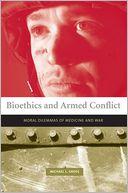 Bioethics and Armed Conflict: Moral Dilemmas of Medicine and War, Michael L. Gross (Cambridge, Mass.: MIT Press, 2006), 400 pp., $65 cloth, $26 paper.
Bioethics and Armed Conflict: Moral Dilemmas of Medicine and War, Michael L. Gross (Cambridge, Mass.: MIT Press, 2006), 400 pp., $65 cloth, $26 paper.
Bioethics and Armed Conflict is a book that people interested in ethics and international affairs will want to have on their shelves. It is important as an analysis of some of the least-discussed dilemmas related to warfare: the ethics of battlefield medical triage, the role of physicians in interrogational torture, weapons research, and peacemaking. The book's value, however, extends beyond its novel subject matter to include its innovative methodology. Michael Gross uses four key principles of bioethics—autonomy, right to life, dignity, and utility (p. 17)—to analyze moral dilemmas of armed conflict. Master's students in my class on ethics and international security loved this book for its real-world issues and systematic arguments.
Although he does not describe himself as such, Gross appears to be what is known as a rule-utilitarian. Like deontologists, rule-utilitarians apply specified principles, or rules, to make decisions and ethical judgments. Unlike deontologists, these theorists use the principle of utility—the greatest good for the greatest number—to evaluate the ethical desirability of particular rules and to arbitrate when they come into conflict. For the rule-utilitarian this means that there are strong ethical presumptions, but not absolute rights and prohibitions. As a rule-utilitarian, Gross does not regard rights that come from any of the four principles of bioethics to be absolute.
There are other rule-utilitarians who have written about international security issues. Nicholas Fotion's work on military ethics and the principles of the just war tradition is especially notable. Gross's work is different from that of most rule-utilitarians, however, because he puts respect for human dignity at almost the same level as utility. He uses both values to justify the conditionality of the principles of rights to life and autonomy on the one hand, and to establish the moral value of the state and military necessity on the other. All of the substantive arguments in the book are based on the hierarchy of values Gross establishes in the first two chapters.
One of the book's major strengths is Gross's willingness to present torture, triage, medical neutrality, and calls to work on weapons development as true dilemmas, not the subjects of foregone conclusions. He is careful to lay out the implications of each of his four values in these troubling situations, and also describes the legal arguments for and against such practices. Gross is more interested in explicating the moral dilemmas than drawing firm conclusions, and his sympathy with arguments from military necessity will no doubt alienate many human rights scholars and practitioners. His openness to the demands of human dignity and autonomy will equally distress neorealists and conservatives.
In situations of armed conflict, Gross argues that military necessity (constrained by the principle of proportionality) trumps other values, but only until it comes to the point of denying human dignity. This turns out, however, to be a much smaller exception than many liberals will accept. Gross differentiates between the overarching concept of dignity as "the fundamental worth of any human being" and its offshoot, "dignity as self-esteem" (pp. 53–54). He regards respect for "fundamental worth" as a nearly absolute right, but argues that entitlements that follow from protecting self-esteem may sometimes give way. Protection from degradation, humiliation, and torture are derived from self-esteem, and therefore these protections are vulnerable (p. 56). Gross does not at any time come out in favor of torture, but he does raise the clear possibility that there could be times when interrogational torture might be morally acceptable (chap. 7). His rule-utilitarian orientation thus gives him a way to question otherwise inviolable rights when they come up against one another.
Military necessity gains further moral value from the state's role in protecting citizens' individual rights to life and the pursuit of their own utility. More than this, military necessity protects what Gross calls the state's "super-aggregate utility" (pp. 34–36). The state represents the "collective welfare of the community" as a community, above and beyond the welfare of individual citizens. The strength of Gross's presumption in favor of the moral value of the state will trouble many scholars of international ethics, especially since he does not fully deal with the complexities introduced by political pluralism in liberal societies. Furthermore, nonstate actors are by definition not capable of super-aggregating utility.
There are some books we recommend because we agree with their conclusions. There are some we like because they give us a new way to understand an old problem. There are still others that prompt us to fill out and refine our own perspectives with new vigor; in short, to argue with the author and each other. Bioethics and Armed Conflict is just such a book.
—FRANCES V. HARBOUR
George Mason University
More in this issue
Summer 2008 (22.2) • Feature
The Rights of Irregular Migrants
Irregular migrants are morally entitled to a wide range of legal rights, including basic human and civil rights. Therefore, states ought to create a firewall ...
Summer 2008 (22.2) • Essay
Irregular Migrants: An Alternative Perspective
While accepting Carens's view that irregular migrants can rightfully claim from the state protection of human rights, Miller disagrees that such migrants can claim rights ...
Summer 2008 (22.2) • Essay
The Resurgent Idea of World Government [Full Text]
The idea of world government is returning to the mainstream of scholarly thinking about international relations. Will the world-government movement become a potent political force, ...